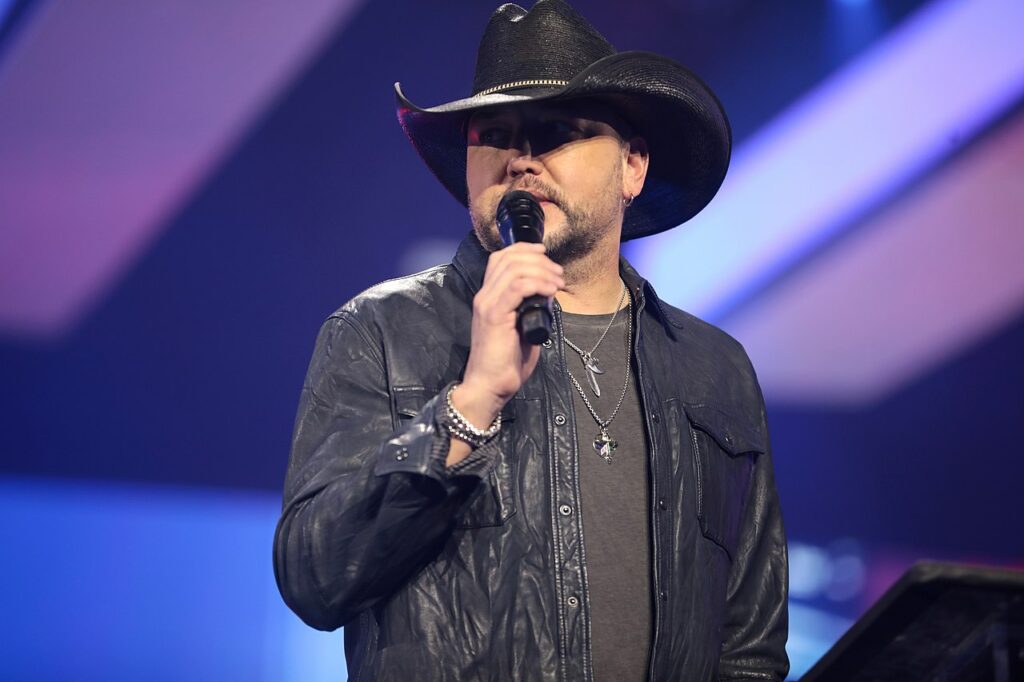Country singer Jason Aldean defended his controversial song “Try That In A Small Town,” and the music video that sparked accusations of racism.
In an interview with Jan Crawford on “CBS Mornings,” the country crooner said he was baffled when the video was criticized for “racist undertones” and seemingly making a “call to arms” when it was released in July.
Crawford noted that the music video, which was filmed at the Maury County Courthouse in Columbia, Tennessee, where a lynching was held in 1927, was construed as “a threatening kind of video for Black people.”
“There was people of all color doing stuff in the video. That’s what I don’t understand,” he shot back.
TUNE IN: Country music star @Jason_Aldean opens up about his controversial hit, “Try That In A Small Town,” which has prompted both backlash and praise, tomorrow on CBS Mornings. pic.twitter.com/9Jo3SqkfVl
— CBS Mornings (@CBSMornings) October 31, 2023
“There was white people in there. There was black people. I mean, this video did not shine light on one specific group and say, ‘That’s the problem.”
He said that if anybody saw that in his video, they weren’t “looking hard enough.”
As for the courthouse the video was filmed at, Aldean said that he was unaware that 18-year-old Henry Choate, who was black, was lynched there.
“But I also don’t go back a hundred years and check on the history of a place before we go shoot it either,” he remarked.
“It’s also the place that I go get my car tags every year. It’s my county that I live in,” Aldean added.
The production company that filmed the music video, Tacklebox, said that the courthouse was a “popular filming location outside of Nashville” and “any alternative narrative suggesting the music video’s location decision is false.”
Recent films shot there include Miley Cyrus starer Hannah Montana, Mario Lopez’s Lifetime Original Steppin’ into the Holiday, and Tanya Tucker’s A Nashville Country Christmas.
Tacklebox also confirmed that Aldean did not select the location himself, though he noted that it would likely be difficult to find a courthouse in the South “that hasn’t had some sort of racial issue over the years at some point.”
He also added that despite the backlash, he doesn’t feel bad about recording the song or shooting the video there “I know my intentions behind [it].”
Aldean did acknowledge that after the uproar over the filming location, he’d pick a different place to shoot if he could go back in time.
“I would do it over again, every time … minus the setting, knowing what I know now, obviously, you know, knowing that that was gonna be a thing, you know, maybe you look at doing it somewhere else,” he told Crawford.
Aldean wasn’t shocked that his song was controversial, but thought it would be over the lyric, “Got a gun that my grandad gave me. They say one day they’re gonna round up.”
“I thought was gonna be the biggest issue with the song was that it said gun,” he noted.
“So, I didn’t expect it to get the kind of heat that it got,” the singer continued. “And I think that was more probably because of the video, more so than the actual song.”
Another point of contention critics had about the video was the use of a Fox 5 Atlanta clip that was filmed during the 2020 Black Lives Matter protests.
The footage was quietly edited out of the video days after it was released on July 14.
Aldean furiously responded to to accusations of “releasing a pro-lynching song” in a social media post on July 18.
In the past 24 hours I have been accused of releasing a pro-lynching song (a song that has been out since May) and was subject to the comparison that I (direct quote) was not too pleased with the nationwide BLM protests. These references are not only meritless, but dangerous.…
— Jason Aldean (@Jason_Aldean) July 18, 2023
“These references are not only meritless, but dangerous. There is not a single lyric in the song that references race or points to it – and there isn’t a single video clip that isn’t real news footage,” he wrote at the time.
“While I can try and respect others to have their own interpretation of a song with music – this one goes too far,” the country singer penned.
He said that the song referred to the feeling of community he had while growing up, “where we took care of our neighbors, regardless of differences of background or belief. Because they were our neighbors, and that was above any differences.”
Months later, he still feels the same way. “I know what the intentions were behind the location, the video, the song, all of it. And, you know, and I stand by all that,” he told CBS.

